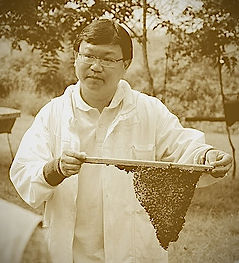When was the last time you did something for the first time?

In the early 2000s, I embarked on a daring journey to Africa, a land often shrouded in mystery—the Dark Continent. Fueled by my desire to explore new horizons, I embraced the opportunity, undeterred by the challenges that lay ahead, all the while sensing the promise of boundless rewards.
It was on the memorable date of February 14, 2001, that fate set in motion a feasibility study trip. My initial plan was to sell fire extinguishers in Uganda, but destiny had different plans for me. It led me to discover Uganda's hidden natural resource treasures - Honey Farming
However, amidst this journey of discovery, a chance encounter with beekeeping completely transformed my path. Uganda's resilient bees met the rising European honey demand, fueled by concerns about colony collapse disorder. My foray into the world of African bees was a formidable endeavor, but I was determined to persevere.
By 2006, I had achieved something truly remarkable. I successfully exported EU-certified honey to Switzerland, earning the prestigious "PRESIDENT EXPORT AWARD (Gold Category)." But the true measure of my success was seen in the lives of the 300 farmers I had the privilege of uplifting, and in the attention of NGOs dedicated to food security that my work garnered.
Simultaneously, Uganda itself experienced a transformation. Peace returned to Gulu and Lira, Northern Uganda after the retreat of the notorious Lord Resistance Army rebels. Beekeeping emerged as a beacon of hope, and I became an advocate for change, empowering communities in the North to rebuild their lives and their futures.
My story is a testament to the power of determination, resilience, and the willingness to embrace unexpected opportunities. My journey, from a simple plan to sell fire extinguishers to becoming a champion of beekeeping in Africa, has transformed the lives of countless individuals—one farmer at a time. It serves as a reminder that even in the face of adversity, one person's dedication can create lasting and positive change in the world.


